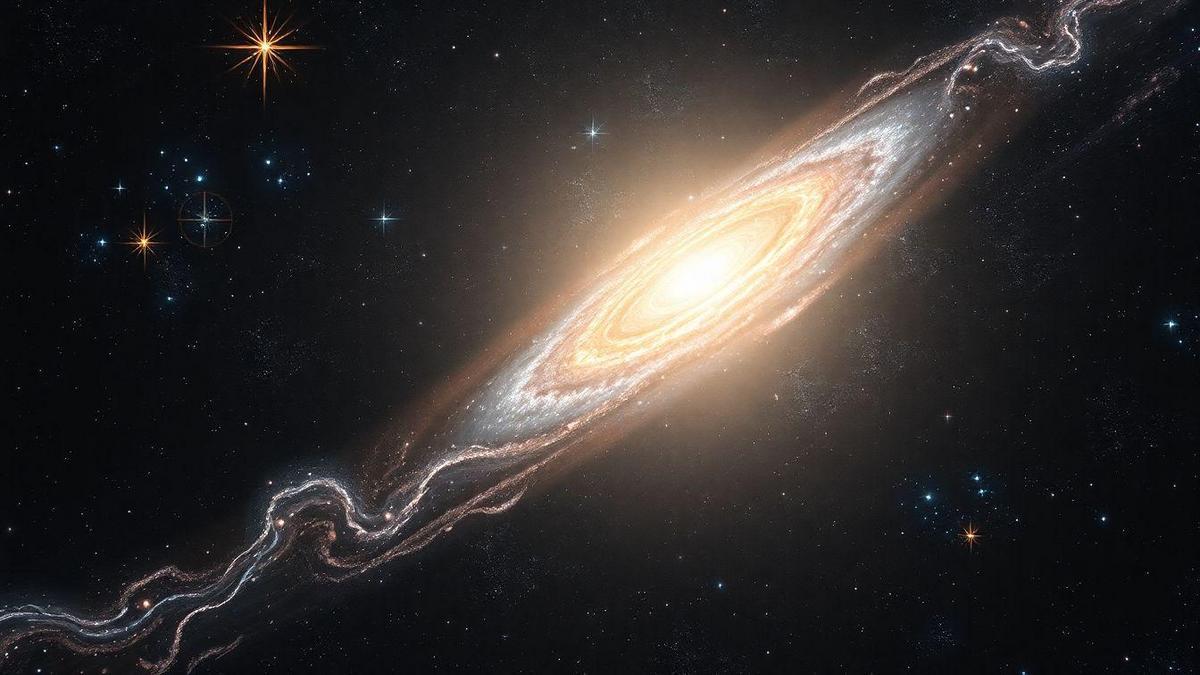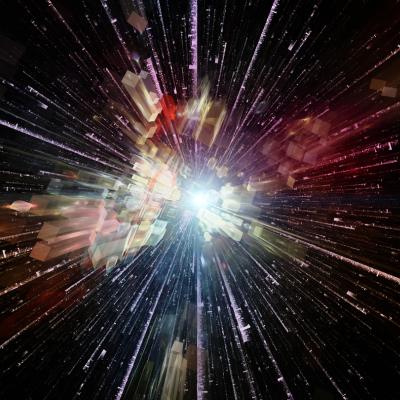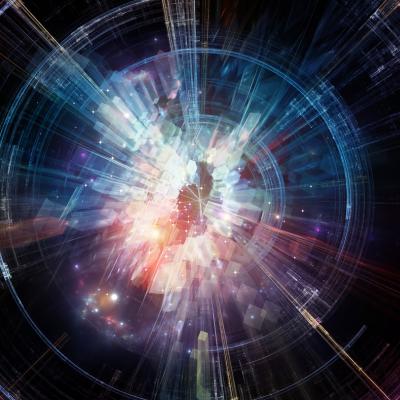Anúncios
The discovery of the accelerated expansion of the universe revolutionized modern cosmology. This phenomenon, driven by the mysterious dark energy, challenges the known laws of physics. Since its identification in the late 1990s, it has become the central focus of intense scientific research.
Studying dark energy brings us closer to understanding the fate of the universe. It represents the largest fraction of the cosmic energy content, even without being directly detectable. Its effects, however, are observable on various cosmic scales.
Anúncios

How Does Dark Energy Contribute to the Accelerated Expansion of the Universe?
Dark energy is a mysterious force that permeates all of space and is considered responsible for the observed acceleration in the expansion of the universe. This phenomenon was discovered in the late 1990s when astronomers observed distant supernovae and noticed they were dimmer than expected. This led to the conclusion that the universe is not only expanding but that the rate of expansion is increasing over time. The concept of dark energy was introduced to explain this unexpected acceleration, becoming a central focus of cosmological research.
The nature of dark energy remains one of the greatest enigmas of modern astrophysics. It is estimated that dark energy makes up about 68% of the total energy content of the universe, while dark matter accounts for about 27%, and ordinary matter only 5%. Despite its significant presence, dark energy does not emit light or energy, making it extremely difficult to detect directly. Its effects are inferred from observations of the large-scale structure of the universe and its expansion history.
The prevailing theory about dark energy is that it is associated with the cosmological constant, a term introduced by Albert Einstein in his equations of General Relativity. This constant represents a uniform energy density that fills space homogeneously. However, there are alternative theories, including dynamic forms of dark energy, which may change over time. Understanding how dark energy contributes to the accelerated expansion of the universe is crucial to unraveling the mysteries of the cosmos and our place in it.
Research on dark energy has profound implications for our understanding of fundamental physics. It challenges our current models of the universe and raises questions about the fate of cosmic expansion. As scientists continue to collect data from various astronomical observations, they aim to refine their understanding of dark energy and its role in shaping the universe.
Advantages of Understanding the Proof of the Accelerated Expansion of the Universe (Dark Energy)

Understanding dark energy and the proof of the accelerated expansion of the universe brings several advantages beyond astrophysics. First, it enhances our understanding of fundamental physics and the laws that govern the universe. By studying dark energy, researchers can test and refine existing theories, leading to possible advances in our understanding of gravity, quantum mechanics, and the fundamental forces of nature.
Second, insights into dark energy can inform our knowledge about the fate of the universe. The accelerated expansion suggests that the universe may continue to expand indefinitely, leading to various scenarios including the “Big Freeze” or the “Heat Death” of the universe. Understanding these outcomes may have philosophical implications, leading us to consider our place in the cosmos and the long-term future of existence.
Additionally, studying dark energy can drive technological advances. The methods and tools developed for cosmological research often lead to innovations in other fields, such as imaging technology, data analysis, and computational methods. These advances can have practical applications in various industries, from medical imaging to telecommunications.
Finally, the quest for knowledge about dark energy fosters international collaboration among scientists and researchers. The effort to understand the accelerated expansion of the universe has brought together experts from diverse fields, encouraging interdisciplinary cooperation and the exchange of ideas. This collaborative spirit not only accelerates scientific progress but also promotes a sense of global unity in the face of shared challenges.
How to Explore the Evidence of Dark Energy and Cosmic Acceleration
Exploring the evidence of dark energy and cosmic acceleration requires a multifaceted approach involving various observational techniques and theoretical frameworks. Here are some key methods to investigate this fascinating area of cosmology:
- Investigate the Hubble Constant and Its Role in the Expansion of the Universe:
The Hubble constant is a measure of the rate of expansion of the universe. By studying the relationship between the distance of galaxies and their redshift, astronomers can refine their measurements of the Hubble constant. This information is crucial to understanding the dynamics of cosmic expansion and the influence of dark energy. - Analyze Observational Cosmology Techniques for Evidence of Dark Energy:
Observational cosmology employs various techniques to collect data on distant celestial objects. Techniques such as observations of Type Ia supernovae, baryon acoustic oscillations, and measurements of the cosmic microwave background provide valuable insights into the universe’s expansion history and the role of dark energy. - Study Astrophysical Theories Related to the Cosmological Constant:
The cosmological constant is a key component of many cosmological models. By studying theoretical frameworks that incorporate the cosmological constant, researchers can explore its implications for dark energy and the expansion of the universe. This includes examining modifications to General Relativity and alternative theories of gravity. - Examine the Structure of the Universe and Its Expansion Patterns:
The large-scale structure of the universe, including the distribution of galaxies and galaxy clusters, provides clues about the influence of dark energy on cosmic expansion. By mapping the structure of the universe, scientists can analyze how dark energy affects the formation and evolution of cosmic structures. - Review Key Discoveries in Cosmic Acceleration Research:
Significant discoveries in cosmic acceleration research, such as the discovery of distant supernovae and the measurement of the cosmic microwave background, have shaped our understanding of dark energy. Reviewing these key findings helps contextualize current research and highlights the progress made in the field. - Track Recent Developments in Dark Energy Studies:
The field of dark energy research is constantly evolving, with new observations and theoretical advances emerging regularly. Staying updated on recent developments, such as future space missions and new observational techniques, is essential for understanding the current state of knowledge about dark energy and cosmic acceleration.
By employing these methods, researchers can deepen their understanding of dark energy and its role in the accelerated expansion of the universe. This ongoing exploration not only enriches our knowledge of the cosmos but also opens new avenues for scientific inquiry.
The Emergence of Dark Energy in Cosmology

Dark energy was proposed to explain the acceleration in the expansion of the universe. Type Ia supernovae appeared less bright than expected. This indicated that the universe was expanding more rapidly over time.
This finding contradicted the belief that gravity should slow down the expansion. Empirical data forced scientists to rethink cosmological models. Thus, dark energy became an essential element in these theories.
Initially viewed with skepticism, dark energy gained credibility with further observations. Other techniques, such as baryon acoustic oscillations, reinforced this evidence. Today, it is considered a real and dominant component of the universe.
Even with its theoretical importance, its physical nature remains unknown. Scientists investigate its properties through observations and theoretical models. The challenge is to unify theory and experiment into a coherent framework.
The Hubble Constant and Cosmic Expansion
The Hubble constant measures the rate at which the universe expands. It relates the distance of galaxies to their redshift. Its value has direct implications for dark energy.
There is a current tension between different measurements of the Hubble constant. Methods based on supernovae differ from those obtained via the cosmic microwave background. This divergence may point to flaws in current models.
This constant is directly linked to the expansion history of the universe. Its behavior at different times helps to understand the influence of dark energy. If it varies over time, this could redefine cosmological parameters.
Therefore, refining the measurement of the Hubble constant is crucial. It may reveal more about the dynamic or constant nature of dark energy. This is one of the major focuses of current observational cosmology.
Did You Enjoy Learning About the Proof of the Accelerated Expansion of the Universe (Dark Energy)?
Learning about the proof of the accelerated expansion of the universe and the enigmatic nature of dark energy is a fascinating journey into the depths of cosmology. The mysteries surrounding dark energy challenge our understanding of the universe and push the boundaries of scientific investigation. As researchers continue to unravel the complexities of cosmic acceleration, they invite us to reflect on the fundamental questions of existence and our place in the cosmos.
The exploration of dark energy not only enriches our knowledge of the universe but also inspires a sense of wonder and curiosity. As we dive deeper into the cosmos, we are reminded of the vastness of the universe and the intricate connections that bind us to it. The quest for knowledge about dark energy is a testament to human ingenuity and our relentless pursuit to understand the mysteries that lie beyond our planet.
Frequently Asked Questions
What is the accelerated expansion of the universe?
The accelerated expansion of the universe is when the space between galaxies is increasing faster over time. This means the universe is stretching!
What causes the accelerated expansion?
It is believed that dark energy is responsible. It is a mysterious force that acts against gravity, causing the universe to expand faster!
How do we know the universe is expanding?
Observations of distant galaxies show that they are moving away from us. This has been measured by a phenomenon called redshift.
What is the proof of dark energy?
The best proof of dark energy comes from supernovae. They are exploding stars, and their light helps measure distances, showing that expansion is accelerating.
Can the accelerated expansion of the universe change in the future?
Yes, it’s possible! Dark energy might behave in unexpected ways and change the universe’s rate of expansion over time.
